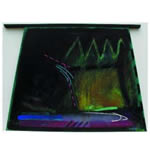|
|
 |
Dusted Reviews
Artist: V/A Album: Free Zone Appleby 2002 Label: Psi Review date: Nov. 18, 2003 |

|
|
|
 |
Over the last couple of years, pioneering British saxophonist Evan Parker has been sneaking out releases on his Psi imprint in association with the very important Emanem label which has for decades been a key documenter of British free improvisation. In addition to bringing back into print crucial sessions like his own The Snake Decides, Parker has been releasing some contemporary recordings that might otherwise fall through the cracks. Now, anyone who plays or listens to the stuff knows how many good performances go unrecorded or, if recorded, go unreleased. But even accepting the reality of the music’s fleetingness – just moments coalescing and occasionally being preserved – it’s good that some rigorous documentarians exist (and Parker has never been shy about releasing his stuff).
So we come to Free Zone Appleby 2002, a two-disc set of music, comprised of varied performances by a group of eight musicians who were gathered into the so-called “Free Zone” of 2002’s Appleby Jazz Festival in England. The octet – who all play together just once – includes Parker on soprano sax, Philipp Wachsmann on violin and electronics, cellist Marcio Mattos, bassist John Edwards, percussionist Mark Sanders, flutist Neil Metcalfe, clarinetist John Rangecroft, and the secret weapon, Sylvia Hallett on voice, violin, and sarangi. The concert opens with a long Hallett solo “Whitethroat”, a soliloquy of creaks, groans, and whistles worthy of Charlotte Hug’s recent solo disc. This is followed by a duet for Parker’s serpentine soprano and Rangecroft’s garrulous, round-toned clarinet (he’s fleet and sounds a bit like Andre Jaume, which makes for an interesting pairing with Parker, like two birds trying to convince each other to take their own flightpath). Rangecroft sits in with Edwards and Sanders on a long trio track, and their unique combination of muscle and sensitivity, bustle and tranquility, sounds great here. The rhythm pair also combines for a weirder, more abstract trio with Hallett (“Phantoms”) on the second disc. While Sanders cranks out an almost tribal beat, Hallett’s ghostly vocal accompaniment to her slashing violin rises up eerily.
To my ears, the following quartet of Rangecroft, Hallett, Mattos and Metcalfe doesn’t cohere quite as well over their 15 minutes. They take an awful long time to find common space, cycling through some less than compelling phrases and devices, and ultimately spend much of their time faffing on texturally. Despite moments of still buzzing and humming, which mark a genuine synthesis, this one doesn’t add up to too much. Much the same fate befalls the Metcalfe/Wachsmann duet on disc two (where the birds never really take flight). Far better is the string quartet with Edwards, Hallett, Mattos, and Wachsmann which closes disc one. Over 20 minutes, the four cycle through an amazing array of textures, layers, stabbing rhythms, and far-flung lines. Think not only Bartok and Ligeti, but also the fine Quator Accorde (who have also recorded for Emanem).
Edwards opens up the second disc with a long solo, and “Pin Drop” is as captivating as Hallett’s solo. It’s so good to hear this versatile bassist in situations where – like his recently released duets with Butcher or Sanders – you can really concentrate on the detail, the passion, and the intelligence of his playing. His near-silent arco whisks and buzzes are the bass equivalent of Butcher’s saxophone inventions. In addition he thwacks the body and detunes the thing in rough deconstruction. The brief “Pica Pica” (a nod to the old FMP album of the same name?) for Hallett and Mattos is almost lattice-thin in its fragility, but provides a nice contrast to some of the other playing. The warm acoustic of the church is particularly fine for the quartet on “MGT4ALL” (Hallett, Mattos, Metcalfe, and Sanders), who achieve a wonderful blend of rising tones and lateral timbres. The closing collective improvisation is admirably restrained and focused, though here the preponderance of upper-register instruments becomes especially apparent.
Not everything on Free Zone Appleby 2002 hits the mark, and there’s an awful lot of music to wade through here. So ultimately this probably isn’t an essential document. But it is stimulating, challenging, pleasing, in addition to being a good opportunity to hear lesser-known players and combinations.
By Jason Bivins
|







